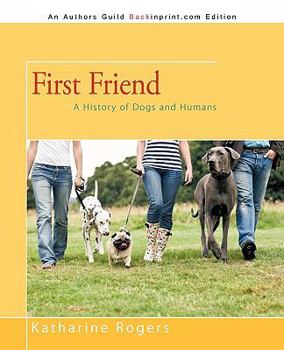First Friend: A History of Dogs and Humans
Select Format
Select Condition 
Book Overview
An exploration of the historical relationship between humans and dogs traces its earliest-known manifestations through its evolution, discussing such topics as dog-human companionship in the ancient... This description may be from another edition of this product.
Format:Paperback
Language:English
ISBN:1450208738
ISBN13:9781450208734
Release Date:April 2010
Publisher:iUniverse
Length:292 Pages
Weight:1.20 lbs.
Dimensions:0.6" x 7.5" x 9.3"
Customer Reviews
2 ratings
A Celebration of Our Closest Animal Friend
Published by Thriftbooks.com User , 19 years ago
"First Friend" offers a mine of information about the history of dogs and the humans who have loved them --- and a few who emphatically did not. Humans were buried with their pet dogs in ancient Jericho, Homer's tough warrior Odysseus wept at the death of his devoted old hound Argus, and greyhounds were valued companions to Roman and medieval aristocrats. The Stuart kings loved their toy spaniels, and the poet Pope (who preferred Great Danes) doubted the goodness of a man who experimented on dogs. In the nineteenth century, Scott created a gallery of engaging canine characters, Byron praised his Newfoundland for having "all the Virtues of Man/ Without his Vices," Dickens regularly enhanced his characters by giving them appropriate dogs (Dora's Jip, Bill Sikes's Bull's-eye), and acerbic Jane Carlyle eulogized her Maltese mix Nero as "my inseparable companion during eleven years, ever doing his little best to keep me from feeling sad and lonely.' The love continues today, of course, with the difference that we are more apt to recognize dogs as equal members of the family. People are no longer comfortable calling themselves the owners of their dogs; humane societies are promoting the term guardian instead.
Commemorating a Great Partnership
Published by Thriftbooks.com User , 19 years ago
One of our dogs, Sammy, the fox terrier, has a behavior I find lovable. When I move in my library to my recliner to read, Sammy will get up from wherever he is to jump on the recliner's footstool and nap. He does not do so to get attention, for I don't thank him or pet him for doing so, and he has not gained in comfort, for he has usually abandoned a comfortable place on the sofa in order to walk over and jump on the footstool which has no more cushioning. He simply finds it more comfortable to be next to his human; I am complimented by this opinion, and I like him all the more for it, every time he joins me in this fashion. Sammy's behavior in this instance, and his behavior and that of my other dogs in many other instances, were on my mind as I read _First Friend: A History of Dogs and Humans_ (St. Martin's Press) by Katherine M. Rogers. Rogers does not include her own anecdotes with the book, but obviously loves dogs (her book is dedicated to her shepherd / retriever mix). This does not keep her from seeing them clearly; she disdains those who see dogs as equals, though she gives many examples of the impulse. Eugene O'Neill, for instance, wrote an epitaph for the family Dalmatian which praised "the only one of our children who has not disillusioned us." Without regarding dogs as furry, four-legged humans, however, there is much to admire in them, and much to admire about the mutually satisfying relationship between the two species. Dogs and humans have been closely associated for millennia; the earliest dog fossil dates from 12000 BCE, and there is a grave from 10000 BCE in Israel that contains the skeleton of an elderly woman buried with a pup. It is clear that humans first found early wolfish dogs helpful, in scavenging and hunting, and humans selected dogs that were obedient and easy to be around. Samuel Johnson was behind his mid-eighteenth century times when he included only two roles for dogs in his _Dictionary_: "The larger sort are used as a guard; the less for sports." There was disapproval that dogs should take any other role. The work ethic came partially from Christianity. St. Thomas Aquinas indicated that since God gave man dominion over animals, man could do what he wanted with them, especially since we could not have true fellowship with creatures that could not reason or attain eternal life. As late as the mid-nineteenth century, Pope Pius IX would not permit in Rome a society against cruelty to animals because such an organization might suggest that humans had duties toward animals. Descartes systematized Aquinas to teach that soulless animals were mere machines, and didn't really feel anything; this did nothing for the hapless dogs taken up by the vivisectionists or the bull- or bear-baiters. Samuel Johnson denounced such treatment, but it took the secular utilitarian Jeremy Bentham to destroy the religious foundations upon which the treatment was founded; a dog is more rational and more able to communicate





